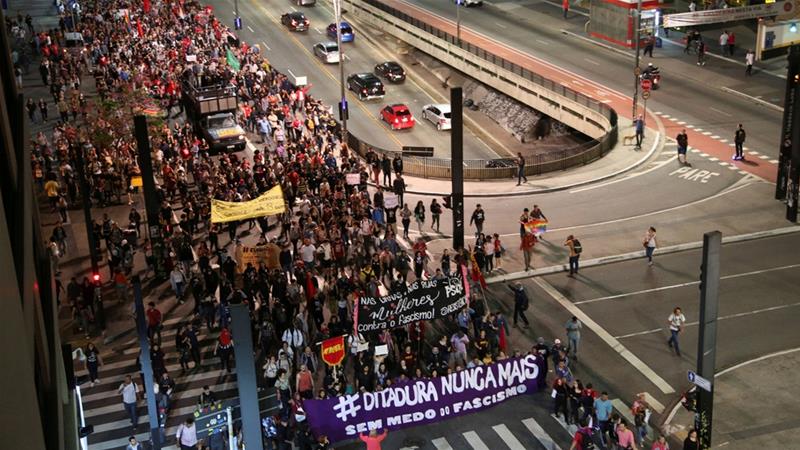
Brazilian Elections

There is a growing uneasiness among Brazilians against Bolsonaro, who has expressed nostalgia for Brazil’s military dictatorship [Amanda Perobelli/Reuters]
The country is enduring the worst economic crisis of the 21st century, as well as a political crisis, with many leaders being jailed for corruption.
The astonishing rise of far-right candidate Jair Bolsonaro completely changed the political landscape of Brazil. Since 1994 the only parties to win a presidential election had been the Brazilian Social-Democracy party (PSDB), with former president Fernando Henrique Cardoso winning two terms, and the worker’s party (PT), with Luis Inacio Lula da Silva and Dilma Rousseff winning two terms each.
The current president, Michel Temer, took office following Roussef’s impeachment. With his approval in the single digits, it was too low for him to even consider running for president.
Brazil nearly escaped the 2007 recession without a scratch because its economy is based mostly on the export of commodities like soy. However, as prices dropped, the Brazilian economy felt shock-waves. An economy that had been thriving suddenly was no longer. And its people were horrified by the succession of corruption scandals publicized by the media and federal police.
Brazil is hardly immune to processes affecting the rest of the world. This is especially regarding the rise of extremist, right-wing candidates. This has played out in Europe, Asia, and even the United States. Jair Bolsonaro represents the Brazilian iteration of this phenomenon. Bolsonaro, a former Army captain and longtime representative who defends easier access to guns and a tougher stand on criminality, has been known to proclaim that the only good criminal is a dead criminal.
Opposing him in the run-off is Fernando Haddad, former Education Minister and former Sao Paulo mayor who was decisively voted out two years ago. Haddad is a member of PT, which has been involved in corruption scandals. Much of its old guard is jailed, including Lula, or gone turncoat on their colleagues in exchange for reduced sentences. Politically, his proposals are left-leaning and he would continue the social programs started under Cardoso’s government and amplified by Lula, albeit in a worse economic context.
On one side, there is a career politician who pines to return to brutal military dictatorship and makes claims that are dangerous to minorities. On the other side is a young politician intending to apply the same social reforms that worked when the country was economically prosperous.
Parallels can be traced to the American presidential election two years ago. Donald Trump was elected even though he was opposed by the media and never held political office. Bolsonaro is also seen as an outsider. But he has been in politics since he left the Army, and he has little to no accomplishments to show it. Haddad is closer to the figure of Hillary Clinton. He is relatively new to the executive field, but he represents the succession of Lula’s ideals. Lula has been in politics since before the re-democratization of Brazil in 1985.
Most alarmingly, Bolsonaro frequently defends the Brazilian military dictatorship of 1964-1985. He often praises torturers, and he favors minority repression. Brazil is a relatively young and fragile democracy. A shock like this could prove a mortal wound. Poland and Hungary show the effects of extreme-right governments on democracies. In the former, the image of Lech Walesa, one of the leaders of the democratic process in the 1980’s, is constantly attacked. Civil and political rights are suppressed.
Democracy is under attack the world over more than any time since the Cold War. Brazilians can stop it from reaching their country again.
In summary, democracy and its institutions in Brazil are at stake. On one side, there is a career politician who pines to return to brutal military dictatorship. This is someone who makes claims that are dangerous to minorities. On the other side is a young politician intending to apply the same social reforms that worked when the country was economically prosperous. This, while his party is involved in numerous corruption scandals. Paraphrasing Mario Vargas-Llosa, this is like choosing between Cancer and AIDS. However, as humans living in a western society, democracy and human rights should come before all else.
October 28th will see the run-off that pits Bolsonaro against Haddad. The hope is in the next 20 days Haddad will change his plans and appeal to moderate Brazilians. And these Brazilians will accept a worker’s party under a coalition government plan to oppose Bolsonaro’s authoritarianism and populism.
Democracy is under attack the world over more than any time since the Cold War. Brazilians can stop it from reaching their country again. They can opt to preserve its institutions and respect for all of its people. All we can do is hope that they do so.
-Roberto Malta is a Brazilian born George Mason University student pursuing a B.A. in Global Affairs, with minors in History and Economics.
